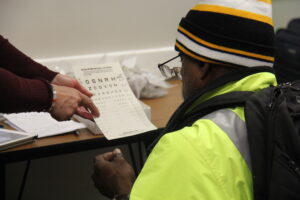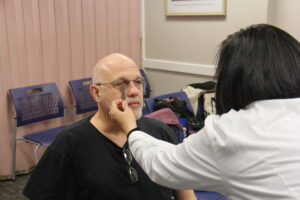Ms. B., a 32-year-old woman, walked into SOME Health Services because of a red and increasingly painful left eye. The COVID-19 pandemic had led to the loss of her job in the midwest, and she had very recently moved to DC, where she hoped to find employment and could avoid housing costs by living in the apartment of a friend.
 Ms. B. was very nearsighted (she could not see the big “E” at the top of the eye chart), did not have eyeglasses, and was using one contact lens in her left eye in order to see well enough to potentially work. The other contact lens had been lost. It was readily apparent that Ms. B. had a corneal ulcer due to her contact lens, which she had used for nearly a year. The cleaning of the lens had been haphazard due to the cost of the cleaning solution.
Ms. B. was very nearsighted (she could not see the big “E” at the top of the eye chart), did not have eyeglasses, and was using one contact lens in her left eye in order to see well enough to potentially work. The other contact lens had been lost. It was readily apparent that Ms. B. had a corneal ulcer due to her contact lens, which she had used for nearly a year. The cleaning of the lens had been haphazard due to the cost of the cleaning solution.
The ulcer was very near the center of the cornea, and if it worsened and affected the center of the cornea, Ms. B. probably would have required a corneal transplant in order to regain reasonable vision in the affected eye. (The cornea can be thought of as a clear window at the front of the eye.)
Ms. B. was terrified of losing her vision due to the corneal ulcer. She did not have health insurance or the monetary resources to pay for the topical antibiotics needed to treat the ulcer. SOME helped her apply for health insurance, paid for the indicated antibiotics, assisted her in obtaining prescription eyeglasses without charge, and carefully followed the corneal ulcer in the clinic as it was being treated to make sure that alternative treatment or referral to a corneal specialist was not needed.
Fortunately, the ulcer completely resolved with no residual scarring. Now, one would never know that Ms. B. had a corneal misadventure.
Eye exams and eyeglasses are difficult to obtain for people experiencing homelessness, yet seeing well exponentially facilitates obtaining education, job training, and employment, thus breaking the cycle of poverty and homelessness.
SOME’s Eye Clinic plays a significant role in providing adequate vision for our clients.
 Dr. Wendy Gasch, a Board-certified ophthalmologist, has been providing expert and compassionate treatment to poor and homeless patients at SOME for the past 15 years. Dr. Gasch provides comprehensive eye exams, primary and/or secondary preventative care, and patient education.
Dr. Wendy Gasch, a Board-certified ophthalmologist, has been providing expert and compassionate treatment to poor and homeless patients at SOME for the past 15 years. Dr. Gasch provides comprehensive eye exams, primary and/or secondary preventative care, and patient education.
The Eye Clinic addresses serious eye problems, including:
- Many patients have diabetes
- These patients are monitored regularly for related eye problems.
- A significant number of patients have glaucoma
- These cases are monitored and treated in the Clinic.
- Regular tests are done free of charge at Washington National Eye Center (located at Washington Hospital Center) for patients with referrals from SOME.
- Nearly all Eye Clinic patients need eyeglasses.
- Patients who would benefit from over-the-counter reading glasses are given a pair, donated by the Lions Club of Virginia.
- Eyeglasses prescriptions can be taken to an optical shop or the Prevention of Blindness Society of Metropolitan Washington (POB). POB provides glasses free of charge to SOME patients.
